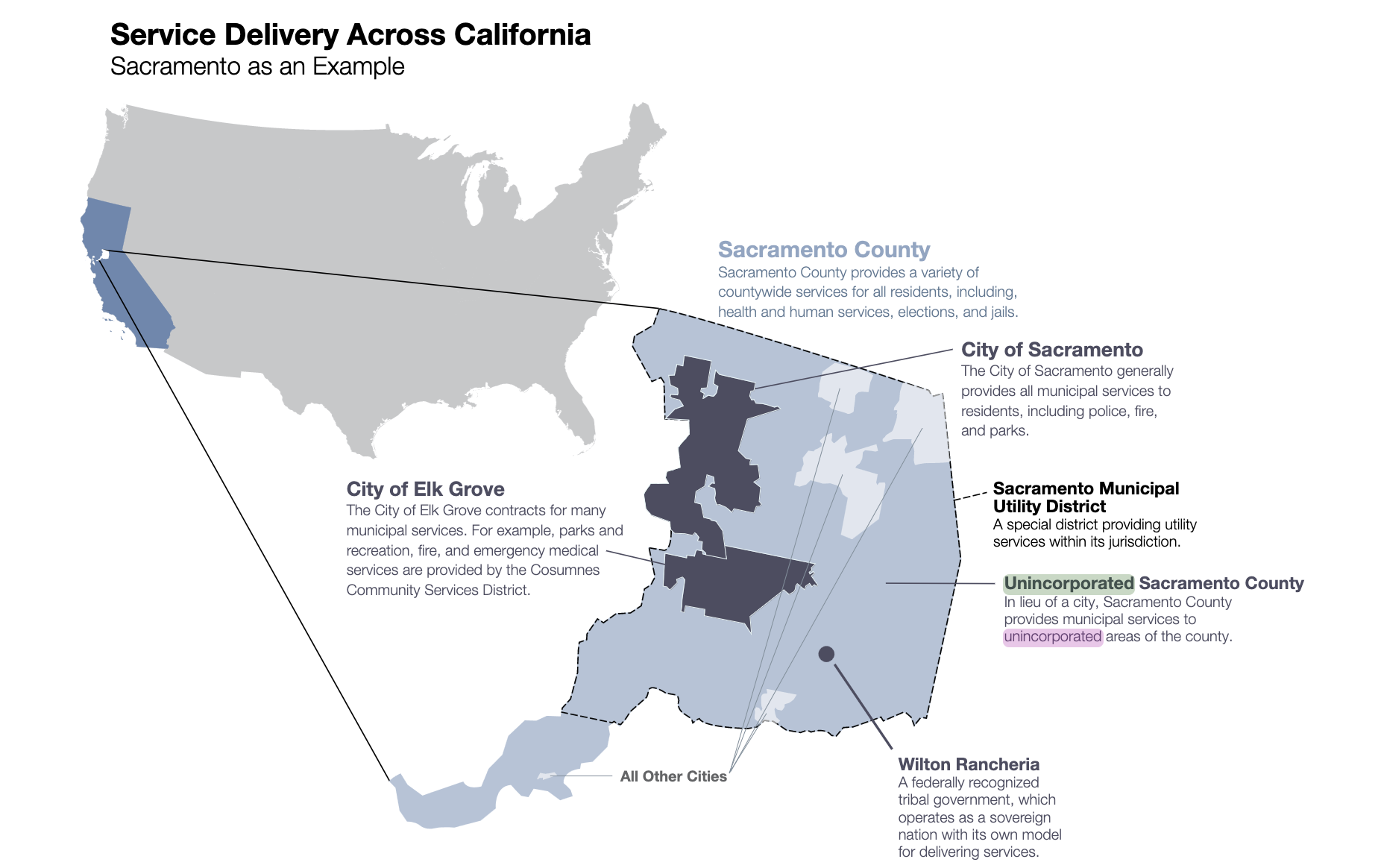Democracy & fairness for unincorporated areas are off-radar at the Capitol
The Office of the Legislative Analyst (LAO) has a new report out that seeks to stimulate serious consideration in the Legislature of critical, long-term issues. Entitled, Key Fiscal and Policy Issues Facing California, the report, in the words of the LAO, "identifies some of the biggest and most complex policy issues facing the state and its policymakers. Given the significance and complexity of these issues, our discussion of each issue is necessarily high level and does not provide recommendations. Rather, our hope is that Key Issues can serve as a helpful resource to the Legislature as it evaluates fiscal and policy solutions aimed at tackling some of the state's most challenging, but critical, long-term issues."
The report has 3 chapters. Chapter 1 is about "Economic Growth and Opportunity", i.e. the economy and physical infrastructure. Chapture 2 covers "Health, Safety and Well-being", things like housing, homelessness, climate change and crime. Chapter 3 of the report addresses "Fiscal Health, Governance and Oversight", including "Intergovernmental Relations". It is about how the state implements the issues in the other two chapters.
When you look at the actual substance of the report's concerns about local government, it's really just about ways for the state to interface with the EXISTING array of local governments. What happens in the state's unincorporated areas is overlooked. Never mind that California has about as many unincorporated area residents as the states of South Carolina or Alabama have people. Or that the unincorporated area population of California exceeds that of the states of Nebraska and Arkansas COMBINED. The report, like most members of the Legislature, seems oblivious to the actual needs of California's massive unincorporated area population. Keep in mind that half the states in our country, though they each have less residents than live in unincorporated California, have their own members of Congress along with their own state Legislature, Governor, state agencies and court system. Their voices are heard. Our urbanized, unincorporated nobodies, though, do not even have Mayors and City Councils to focus on local priorities. They are NOT heard.
The LAO report has clarified the issues they think matter for local governance in California. Those issues, they say in the report's text, are:
- "In What Policy Areas Is Expanding the State Role Warranted? Some programs can be more effectively administered by the state, for example, when statewide uniformity is important. Other programs—like those where flexibility to meet diverse needs is necessary—can be more effectively controlled by local governments. When determining how responsibilities should be divided between state and local governments, the Legislature could consider whether and to what extent to limit local control. For instance, the Legislature can limit local control in matters of statewide interest. The Legislature also may wish to limit local control in order to promote equitable access and outcomes in "service delivery.
-
What Is the Fiscal Capacity of Local Governments? Local governments have limited
authority to raise revenues relative to the state and federal governments. Given that
limitation, when creating new local requirements, the Legislature may want to consider the
fiscal capacity of local governments to deliver services. While the State Constitution requires
state funding for mandated public programs, some laws impose requirements on local
governments that do not require state funding. In order to promote collaboration among
governments, the Legislature may wish to consider the fiscal constraints local governments
may face. - How Can the State Foster and Oversee Effective Collaboration to Address Major Crosscutting Issues? Successfully addressing the most complex issues facing the statewill require effective collaboration across many levels of government. The Legislature may want to consider when the state should take the lead in collaborating across governments versus when regional coordination is warranted (potentially with state-level oversight)."

In a nutshell, the report is policy wonk talk about whether and how the state should step in and do a local government's job. It doesn't even begin address the needs of people who don't even HAVE a municipal government. Maybe, when fiddling with how to "limit local control in order to promote equitable access and outcomes in
service delivery", the Legislature should ask if local control exists in the first place. Perhaps, when considering "the fiscal constraints local governments may face", the Legislature could ask if there are level fiscal playing fields for local governments across the state. And what if, before taking "the lead in collaborating across governments", the Legislature inquired as to whether anyone - such as residents or businesses in the state's unincorporated areas - has been left out of any discussions of regional coordination.
Our bottom line? The Legislature should pay attention to the 5 million Californians who live in urbanized, unincorporated areas. Acknowledge that we exist. Understand our situation. Implement the reforms we seek. We are tired of being left out of the discussion.
